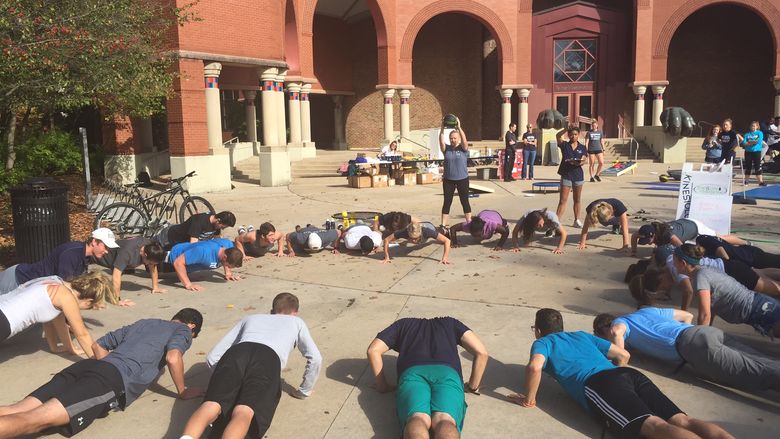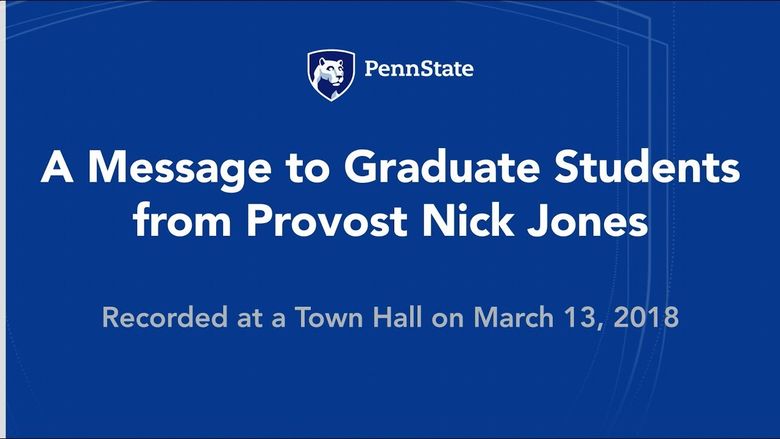UNIVERSITY PARK, Pa. — Ten Penn State graduate students received the 2017 Harold F. Martin Graduate Assistant Outstanding Teaching Award.
Each of the award winners demonstrate a commitment to excellence, going above and beyond classroom instruction to shape the lives of their students. Their passion and dedication exemplify the impact Penn State’s graduate students have on society.
The award is jointly sponsored by the Graduate School, through the Harold F. Martin Graduate Assistant Outstanding Teaching Award endowment, and the Office of the Vice President and Dean for Undergraduate Education. Recipients must have served as a graduate assistant for at least two semesters within the last two years. The award is named for Harold F. Martin, who earned his doctoral degree in education in 1954, and retired as a director in the Pennsylvania Department of Education.
The award recipients are Azeta Hatef, doctoral student in mass communications; Laura Hudock, doctoral student in curriculum and instruction; Cory Hutcheson, doctoral student in American studies; Yurika Matsui, doctoral student in molecular, cellular and integrative biosciences; Caitlin McMenamin, doctoral student in anatomy; Jesse McTernan, doctoral student in aerospace engineering; Thomas Newman, doctoral student in kinesiology; Edward O’Byrn, doctoral student in philosophy; William Paris, doctoral student in philosophy with a dual title in women’s studies; and Briana Sprague, doctoral student in human development and family studies.
Hatef, a doctoral student in mass communications, aims to provide students with the resources to critically examine media structures and processes, with the goal of producing a community of socially and politically aware students. Her passion for teaching and research is evident to her students, which is reflected in her SRTEs and the feedback from her students, who praise her for being, "thought-provoking," "extremely helpful," and "always prepared."
Hudock, a doctoral student in curriculum and instruction, believes in a student-centered approach to her teaching, and prioritizes building a classroom community of empathetic learners. Her passion and dedication are evident to her students who come to rely on her as an instructor and friend, even after they leave her classroom. Hudock personally ran review sessions to help her former students prepare for the Pennsylvania Educator's Certification Test. Under faculty supervision, Hudock re-wrote the syllabus for Language and Literacy Education 402, Teaching Children’s Literature, to reflect current trends, practices and accreditation standards, and other faculty have subsequently adopted it.
A doctoral student in American studies, Hutcheson has found ways to expand his classroom beyond institutional walls. He provokes student thinking and class participation, and has earned a reputation for leading one of the best classes in the American Studies department. He singlehandedly turned a low-enrollment course into one of the most sought-after classes. Hutcheson is an innovative instructor and has revised existing approaches to teaching courses to introduce thematic content and involved ideas of cultural diversity around the social and cultural uses of spirituality by different communities in America.
Matsui, a doctoral student in molecular, cellular and integrative biosciences, focuses her research on the mechanisms of a tumor-suppressive pathway known as the Hippo Pathway. She is investigating functions and biological importance of isoform expression in the Hippo Pathway. Matsui is a dedicated teaching assistant for the lab sections of Biology 230W, Cells and Molecules. In 2016, Matsui was asked by the course coordinator to serve as the graduate lab coordinator, where she manages 40 teaching assistants who run 26 sections of Biology 230W, organizes weekly meetings, and prepares course content and materials.
McMenamin, a doctoral student in anatomy, has already achieved great success as a graduate student. Her dissertation research has resulted in three first-authored publications, with an additional three first-author manuscripts in the works. Even with a demanding graduate student workload, McMenamin is heavily involved in teaching gross anatomy and neuroanatomy to medical students. McMenamin uses a variety of teaching strategies and learning styles to help encourage student participation. She uses weekly feedback assessments from students to identify student problems and will adjust her teaching strategies to fit the strengths of individual students and classes.
A doctoral student in aerospace engineering, McTernan's passion for teaching began as a teenager, when he volunteered to teach swimming lessons at a local pool. He is now a teaching assistant for a first-year course in engineering, and one of his main strengths is his ability to connect with his students. A student in the class wrote, "I cannot speak highly enough of him as a teacher. He was very dedicated to making sure we learned and understood the design process. Class was very interactive and never boring. Furthermore, I always felt comfortable asking him for help when I needed it. I am very grateful that I had him as professor."
Newman, a doctoral student in kinesiology, has research interests in preventative medicine in athletics. Newman is responsible for teaching two lab sections of Kinesiology 202, Functional Human Anatomy, where he leads cadaver identification; sets up muscle, nerve and bone model stations; and creates practical exams and weekly quizzes. "Thomas is a natural leader and goes above and beyond most students I have worked with [in the past], and he takes absolute pride in his preparation and dissemination of information in all aspects of teaching anatomy," said one nominator.
A doctoral student in philosophy, O’Byrn's dissertation is focused on the 20th-century black existentialist movement. He also serves as the president of the philosophy graduate student organization. O’Byrn is responsible for three classes per academic year. He designs the syllabus, readings and assignments for these classes under the supervision of the director of graduate studies and a teaching mentor. According to his teaching mentor, "Edward's relaxed attitude is combined with dynamic lectures. He challenges students, all of whom are untrained in philosophy, to think philosophically. He presents difficult ideas in ways that students can understand."
Paris, a doctoral student in philosophy with a dual title in women’s studies, is an excellent instructor, with high SRTEs backed by glowing comments from his students. As an instructor, Paris is organized, well-researched and maintains a friendly style in the classroom. A student in the class wrote, "I love Will's style of teaching, he is an excellent teacher that wants to see his students succeed and actually learn!" Paris sees his role as a philosophy teacher to "continually stage an encounter between 'the study of philosophy' and 'philosophical study.'"
A doctoral student in human development and family studies, Sprague is a talented teaching assistant who has been able to maintain an impressive research portfolio with six papers in press or under review. Sprague regularly receives high teaching scores and is frequently requested as a teaching assistant by faculty. One nominator wrote that "Briana's passion for student learning and good pedagogy are clearly seen in her interactions with students ... She is well-deserving of this award and will be a wonderful teacher."
All of the students were honored during the annual Graduate Student Awards Luncheon held on April 18 at the Nittany Lion Inn.


